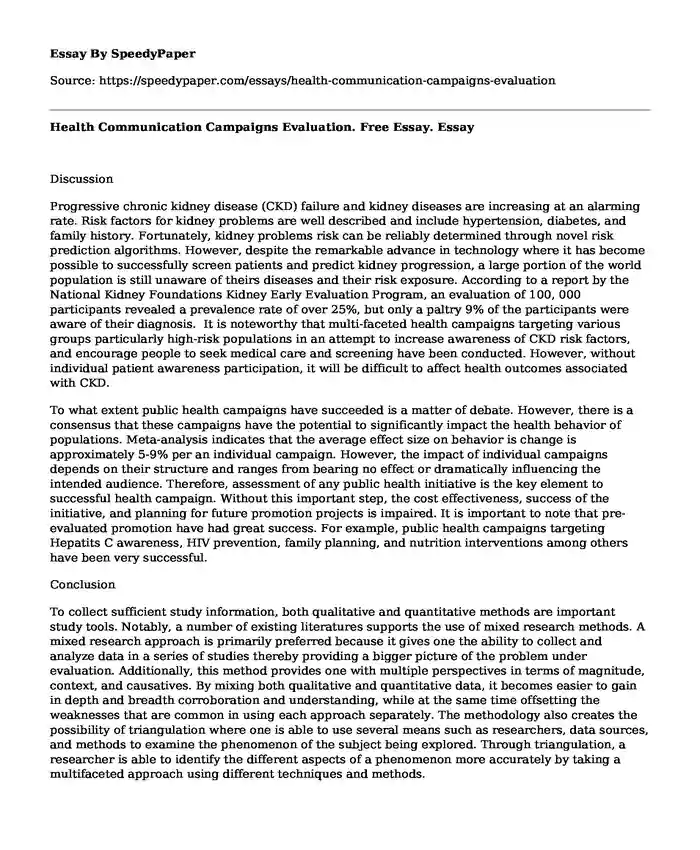
| Essay type: | Evaluation essays |
| Categories: | Nursing Medicine |
| Pages: | 3 |
| Wordcount: | 814 words |
Discussion
Progressive chronic kidney disease (CKD) failure and kidney diseases are increasing at an alarming rate. Risk factors for kidney problems are well described and include hypertension, diabetes, and family history. Fortunately, kidney problems risk can be reliably determined through novel risk prediction algorithms. However, despite the remarkable advance in technology where it has become possible to successfully screen patients and predict kidney progression, a large portion of the world population is still unaware of theirs diseases and their risk exposure. According to a report by the National Kidney Foundations Kidney Early Evaluation Program, an evaluation of 100, 000 participants revealed a prevalence rate of over 25%, but only a paltry 9% of the participants were aware of their diagnosis. It is noteworthy that multi-faceted health campaigns targeting various groups particularly high-risk populations in an attempt to increase awareness of CKD risk factors, and encourage people to seek medical care and screening have been conducted. However, without individual patient awareness participation, it will be difficult to affect health outcomes associated with CKD.
To what extent public health campaigns have succeeded is a matter of debate. However, there is a consensus that these campaigns have the potential to significantly impact the health behavior of populations. Meta-analysis indicates that the average effect size on behavior is change is approximately 5-9% per an individual campaign. However, the impact of individual campaigns depends on their structure and ranges from bearing no effect or dramatically influencing the intended audience. Therefore, assessment of any public health initiative is the key element to successful health campaign. Without this important step, the cost effectiveness, success of the initiative, and planning for future promotion projects is impaired. It is important to note that pre-evaluated promotion have had great success. For example, public health campaigns targeting Hepatits C awareness, HIV prevention, family planning, and nutrition interventions among others have been very successful.
Conclusion
To collect sufficient study information, both qualitative and quantitative methods are important study tools. Notably, a number of existing literatures supports the use of mixed research methods. A mixed research approach is primarily preferred because it gives one the ability to collect and analyze data in a series of studies thereby providing a bigger picture of the problem under evaluation. Additionally, this method provides one with multiple perspectives in terms of magnitude, context, and causatives. By mixing both qualitative and quantitative data, it becomes easier to gain in depth and breadth corroboration and understanding, while at the same time offsetting the weaknesses that are common in using each approach separately. The methodology also creates the possibility of triangulation where one is able to use several means such as researchers, data sources, and methods to examine the phenomenon of the subject being explored. Through triangulation, a researcher is able to identify the different aspects of a phenomenon more accurately by taking a multifaceted approach using different techniques and methods.
Mixed methodology was used in the present study because of several reasons. Firstly, there was a need to validate or corroborate findings from other studies and to have one method inform another method. This decision was informed by the fact that little is known about the efficacy of CKD awareness campaigns and it was necessary to first learn about different variables that may influence the studys findings. By building on other methods, it was possible to establish causal relationships by understanding the causal processes.
Patient-level CKD campaigns includes understanding of individual risk and CKD status as well as general knowledge of CKD, the risk factors, and its health consequences. Awareness of CKD is dependent on understanding of individual risk, which is influenced by general knowledge of CKD. Failure to achieve general awareness of CKD precludes becoming aware of individual risk exposure. Therefore, there is a need for more research that will guide the implementation of awareness campaigns, including determining the most appropriate target populations and content. Notably, the effects of promotional campaigns are influenced by a myriad of factors including patient health literacy, psychological disposition, and patient-provider communication. These factors, though difficult to measure plays a larger part in modifying CKD awareness and development of preventive behavior. Additionally, there is a need for more resources as there is no single dataset or study pool with sufficient predictors and outcomes of CKD awareness. From the foregoing, it is noteworthy effective CKD campaigns are based on strategic evaluation. This is because different groups have varying demographic features, and what works for one group may not work for another one. As CKD prevalence continues to grow at alarming rate, there is an urgent need for evidence-based campaigns that can positively influence knowledge of CKD. Indeed, better management of CKD will slow its progression, prevent complications, and reduce morbidity and mortality rates. Through early detection, CKD can be managed. For example, early referral to a nephrologist can have improved outcomes for those who have end-stage renal disease.
Cite this page
Health Communication Campaigns Evaluation. Free Essay.. (2017, Sep 13). Retrieved from https://speedypaper.net/essays/health-communication-campaigns-evaluation
Request Removal
If you are the original author of this essay and no longer wish to have it published on the SpeedyPaper website, please click below to request its removal:
Popular categories




